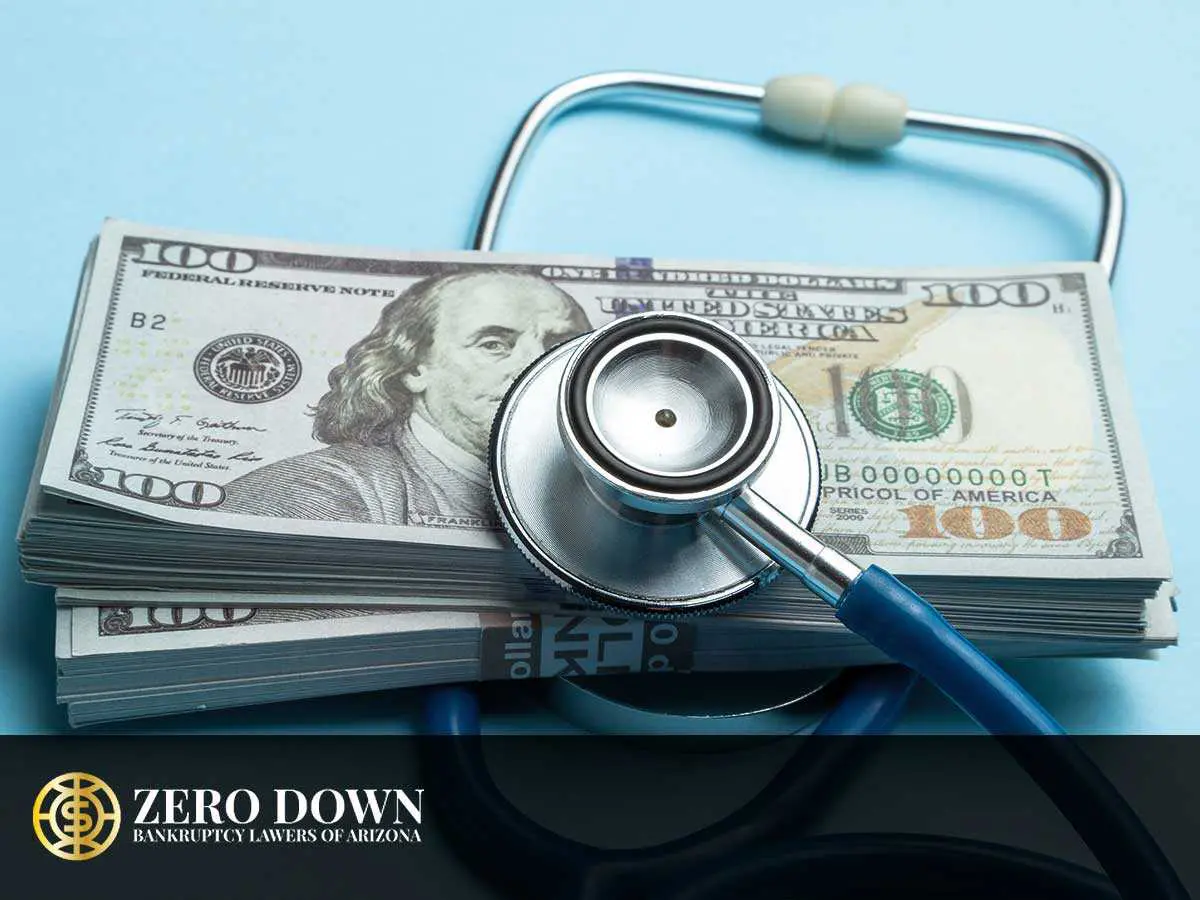Phoenix Bankruptcy Attorneys Explain How To Deal With Medical Debt
After an illness or injury, even with health insurance, you may be left with medical bills that you can’t afford to pay. Hospital visits, x-rays and other imaging tests, medications, physical therapy, and other treatments can be highly expensive, but necessary to recover you to full health. But especially when combined with lost income due to time off work, paying off these medical bills may be infeasible for you.
Hospital Debt Financial Assistance
If your debt is largely from a hospital, as opposed to specialists, dentists, etc., you may qualify for the hospital’s financial assistance program. Many hospitals have tiered financial assistance programs. This means that bills could be partially or entirely forgiven based on the patient’s income level.
The following is an example of a hypothetical hospital financial assistance plan. One way to qualify would be to have an unpaid balance of at least $2,500 if your family’s income doesn’t exceed 400% of the federal poverty level. A patient who is uninsured and whose family doesn’t exceed 400% of the federal poverty level will also qualify. Lastly, a medically indigent patient whose medical bills from the past 12 months exceed 50% of their family’s income will also qualify. Patients who don’t meet these qualifications can also petition the hospital for a financial hardship forgiveness. In general, hospital debts will be forgiven for qualifying patients in the following tiers. If your family income is less than 200% of the federal poverty income guidelines, your hospital bills will be entirely forgiven. For patients whose family income is between 200%-300% of the federal poverty level, 75% of hospital bills will be forgiven. Patients whose family income falls between 300% and 400% of the federal poverty level will have 50% of their bills forgiven. Your hospital’s plan may vary, so be sure to check their specific financial assistance policy.
Negotiate Your Hospital Bills
If your family’s income is too much higher than the federal poverty guidelines, you may not qualify for your hospital’s financial assistance program. That doesn’t necessarily mean you will have to pay your bills in full. The worst your medical provider can say if you ask for a reduction in your bills is no. If you are uninsured, the amount an insurance company would’ve paid for you is a good baseline to start negotiations. An Phoenix bankruptcy attorney may be able to assist you with these negotiations, but it likely won’t be cost-effective unless you have a significant amount of medical debt.
Review Your Medical Bills
Your hospital should be able to provide an itemized bill for your medical services. You should carefully review this itemized bill, as you may be able to reduce it. There may be errors or duplicate billings that need to be removed. There may also be unauthorized charges that you wouldn’t have noticed without an itemized bill. You can cross-reference this list with expenses your insurance is supposed to cover. This may significantly reduce the amount you owe to the hospital.
Request a Payment Arrangement With Your Hospital
Whether your hospital doesn’t agree to reduce the amount you owe, you may still be able to pay your bill in monthly installments instead. This can help you avoid creditor calls, negative credit impact, and your debt eventually being sold to a debt collection company. Your goal should be to keep the interest rate in your payment plan as low as possible.
Chapter 7 Bankruptcy
If the above options fail, or if you have other types of debt besides hospital bills, you may want to consider declaring bankruptcy. Chapter 7 is the most common type of consumer bankruptcy, and liquidates and discharges most unsecured debts. Medical debts are among the debts that can be discharged without any repayment in Chapter 7 bankruptcy. However, Chapter 7 is only available to those who qualify.
To qualify, your income must be below the state median income for your family size. Otherwise, you must pass the Means Test, which deducts mandatory expenses from your average monthly income to determine if you have sufficient disposable monthly income to pay your debts. Chapter 7 also seeks to exclude those with adequate financial means by setting limits on property value known as exemptions. Any assets that aren’t protected by exemptions may be seized and sold to pay creditors.
Chapter 7 also requires that filers create credit counseling courses before and after filing their bankruptcy petitions. Anyone who files bankruptcy must also attend a hearing known as a 341 Meeting of Creditors, but you may need to attend additional hearings depending on your specific circumstances. If you complete all the necessary steps, your debts- including medical debts- will be discharged within 4 to 6 months.
Chapter 13 Bankruptcy
The second most popular type of consumer bankruptcy is Chapter 13. Chapter 13 is available to those who don’t meet the strict income limitations of Chapter 7. Chapter 13 is also referred to as a wage earner’s bankruptcy because it is a payment plan based on your disposable monthly income. Payment plans last 3 years for those who fall below the state median income line, and 5 years for those who make more than that amount. Exemptions don’t apply in Chapter 13, so you don’t need to worry about whether your assets are protected if you use this chapter.
Debts are paid in four categories in a Chapter 13 payment plan. The first category to be paid is your legal costs associated with the bankruptcy. Fees to your attorney and trustee are paid first. Next, your secured debts are paid. Some secured debts must be paid in full in your plan, but you can generally pay an amount similar to your monthly mortgage for that loan. Third, priority debts will be paid. The last category to be paid is unsecured debts. This category doesn’t need to be paid in full to be discharged at the end of the plan. Medical debts, as well as credit cards, personal loans, and more, are included in this category.
While the success rate for pro se (self-represented) Chapter 7 bankruptcies is much higher than pro se Chapter 13 bankruptcies, it is still advisable to seek the guidance of a Tucson bankruptcy attorney in either case. An attorney will make sure you are filing under the correct chapter, that your petition is correct, and that all other issues in your case are handled promptly.
Let Our Arizona Bankruptcy Lawyers Assist You With Your Medical Debt
If you need help deciding between your options to address your medical debt, our Arizona debt relief attorneys are here to help. We offer affordable rates and payment plans to fit every budget. To get started with your free debt evaluation, call or use our online form to schedule today.
Arizona Offices
Phoenix Location:
343 W Roosevelt Street, Suite #100
Email: [email protected]
Phone: 602-609-7000
Mesa Location:
1731 West Baseline Rd., Suite 101
Email: [email protected]
Glendale Location:
20325 N 51st Avenue, Suite #134
Email: [email protected]
Tucson Location:
Email: [email protected]










